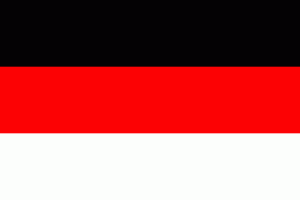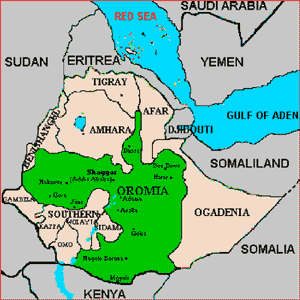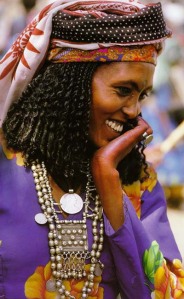 Oromia is one of the largest countries in Africa and yet few have heard of it – because it is inside another country, Ethiopia. Ethiopia was created as the empire of the Amhara. It is made up out of five or so other countries. The largest of these is the land of the Oromo, Oromia. It lies at the centre of Ethiopia and extends to the south and to the west. It is bigger than France but has only half as many people, about 30 million. In our own time it has become the scene of genocide.
Oromia is one of the largest countries in Africa and yet few have heard of it – because it is inside another country, Ethiopia. Ethiopia was created as the empire of the Amhara. It is made up out of five or so other countries. The largest of these is the land of the Oromo, Oromia. It lies at the centre of Ethiopia and extends to the south and to the west. It is bigger than France but has only half as many people, about 30 million. In our own time it has become the scene of genocide.
 The Oromo are much like the Somalis in language, custom and race. They speak Oromo, one of the top ten of the thousand languages of Africa. While the Somalis live in the eastern end of the Horn of Africa, the Oromo live just to the west of them in southern Ethiopia and northern Kenya. But while nearly all Somalis are Muslim, only half of the Oromo are: the other half are Christians, though some do still practise the native Oromo religion.
The Oromo are much like the Somalis in language, custom and race. They speak Oromo, one of the top ten of the thousand languages of Africa. While the Somalis live in the eastern end of the Horn of Africa, the Oromo live just to the west of them in southern Ethiopia and northern Kenya. But while nearly all Somalis are Muslim, only half of the Oromo are: the other half are Christians, though some do still practise the native Oromo religion.
Most were herdsmen raising cows until the 1800s. Many still are, but now most are small-time farmers, a change that began in the 1800s. Trade also increased then. That gave great power and wealth to those who could control it, so in the early 1800s Oromia was ruled by warlords. Then in the late 1800s the Amhara took over and made Oromia a part of their country, Abyssinia, now called Ethiopia.
 It was not enough for the Amhara simply to rule, collect taxes and keep the peace. They went beyond that. They saw the Oromo as savages, as backwards and violent. They tried to make them into good Amharas, speaking the Amharic tongue and worshipping in Orthodox Christian churches. Amharic became the language that school was taught in (till 1995). Some Oromo were ordered to become Christians or lose their land. The Amhara outlawed the practice of the old Oromo religion. They also outlawed the Oromo flag of black, red and white (pictured above).
It was not enough for the Amhara simply to rule, collect taxes and keep the peace. They went beyond that. They saw the Oromo as savages, as backwards and violent. They tried to make them into good Amharas, speaking the Amharic tongue and worshipping in Orthodox Christian churches. Amharic became the language that school was taught in (till 1995). Some Oromo were ordered to become Christians or lose their land. The Amhara outlawed the practice of the old Oromo religion. They also outlawed the Oromo flag of black, red and white (pictured above).
The Amhara broke down Oromo society to weaken it – although it had already been weakening under the warlords. They sent settlers to live on Oromo land and wrote in their history books that it was the Oromo, not they, who were the newcomers to the region.
Losing one’s Oromo ways and taking on Amhara ways became the way to get ahead. Most of those who did not remained poor – probably proof to some that Oromo ways are backward.
A third of Christians in Oromia are not Orthodox but Protestant. That is high for Ethiopia, but part of the appeal of Protestant Christianity is that it is not the Amhara sort of Christianity.
People like to point out how Ethiopia largely avoided becoming a colony of the European empires – it was ruled by Italy for only five years. But to the Oromo the black man merely took the place of the white man. And he is still there.
See also:





